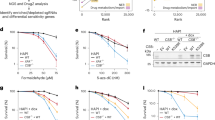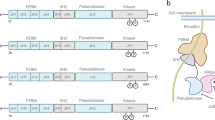Abstract
We have previously shown that transactivation by tumor suppressor protein p53 can be inhibited in vivo at elevated protein concentrations. In this study we characterize the structural requirements of this function. We show that oligomerization domain of p53 is involved in loss of transactivation at high protein concentrations: mutants not able to oligomerize are neither able to suppress transactivation, although these transactivating properties can be untouched.
This is a preview of subscription content, access via your institution
Access options
Subscribe to this journal
Receive 50 print issues and online access
$259.00 per year
only $5.18 per issue
Buy this article
- Purchase on Springer Link
- Instant access to full article PDF
Prices may be subject to local taxes which are calculated during checkout
Similar content being viewed by others
Author information
Authors and Affiliations
Rights and permissions
About this article
Cite this article
Kristjuhan, A., Jaks, V., Rimm, I. et al. Oligomerization of p53 is necessary to inhibit its transcriptional transactivation property at high protein concentration. Oncogene 16, 2413–2418 (1998). https://doi.org/10.1038/sj.onc.1201749
Received:
Revised:
Accepted:
Published:
Issue Date:
DOI: https://doi.org/10.1038/sj.onc.1201749
Keywords
This article is cited by
-
p53 protein accumulation in addition to the transactivation activity is required for p53-dependent cell cycle arrest after treatment of cells with camptothecin
Oncogene (2001)
-
p53/T-antigen complex disruption in T-antigen transformed NIH3T3 fibroblasts exposed to oxidative stress: correlation with the appearance of a Fas/APO-1/CD95 dependent, caspase independent, necrotic pathway
Oncogene (1999)



